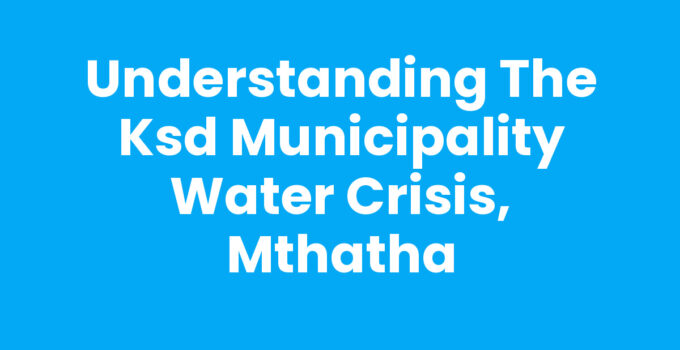The KSD Municipality water crisis in Mthatha has been a growing concern for residents and local authorities alike. With frequent water shortages affecting daily life, understanding the roots, consequences, and potential solutions to this crisis is vital for all stakeholders involved. This article aims to provide comprehensive insights into the water crisis, along with practical steps to mitigate its impacts.
Ksd Municipality Water Crisis, Mthatha: Causes and Effects
The water crisis in KSD Municipality, particularly in Mthatha, stems from a combination of natural and human-induced factors. Chief among these are:
- Inadequate Infrastructure: Aging and poorly maintained water supply systems contribute significantly to water loss through leaks and inefficiencies.
- Climate Change: Changes in rainfall patterns, coupled with prolonged droughts, have reduced the availability of water sources.
- Increased Demand: Population growth in the region has led to higher water consumption, straining the limited resources even further.
- Poor Management: Lack of effective management and planning from local officials can exacerbate the crisis, failing to provide long-term solutions.
The effects of the KSD Municipality water crisis are profound:
- Health risks due to waterborne diseases.
- Challenges in agricultural production affecting food security.
- Disruption of daily life and local economies.
Steps to Combat the Ksd Municipality Water Crisis
To address the Ksd Municipality water crisis effectively, a multi-faceted approach is needed:
1. Improve Infrastructure
Investing in modernizing existing water supply systems is crucial. Local authorities should prioritize fixing leaks and updating aging pipes. This can be done using innovative materials and technologies that minimize water loss.
2. Rainwater Harvesting
Encouraging residents to install rainwater harvesting systems can help supplement local water supplies. This involves collecting rainwater from roofs and redirecting it to storage systems, which can then be used for non-potable purposes such as irrigation or toilet flushing.
3. Community Education
Raising awareness within the community about water conservation practices is essential. Educational programs can empower residents to reduce water consumption through simple techniques, such as fixing leaks at home, using water-efficient appliances, and adopting xeriscaping for gardens.
4. Engage with Local Experts
Consulting with water management experts can provide new insights into the crisis. Workshops and forums can be organized to brainstorm innovative solutions tailored to the specific challenges in Mthatha.
Conclusion: A Call to Action
The Ksd Municipality water crisis in Mthatha presents significant challenges, but with collective effort from local authorities, residents, and experts, solutions can be implemented. It is crucial for the community to actively participate in conservation efforts and advocate for necessary infrastructure improvements. Together, we can work towards a sustainable future with reliable access to clean water for all.
Frequently Asked Questions
What is causing the Ksd Municipality water crisis?
The crisis is primarily due to inadequate infrastructure, climate change, increased demand, and poor management.
How can residents help mitigate the water crisis?
Residents can help by conserving water, installing rainwater harvesting systems, and participating in community education programs.
What steps are local authorities taking to resolve the crisis?
Local authorities are working on upgrading infrastructure, improving water management, and engaging with community members for sustainable solutions.









